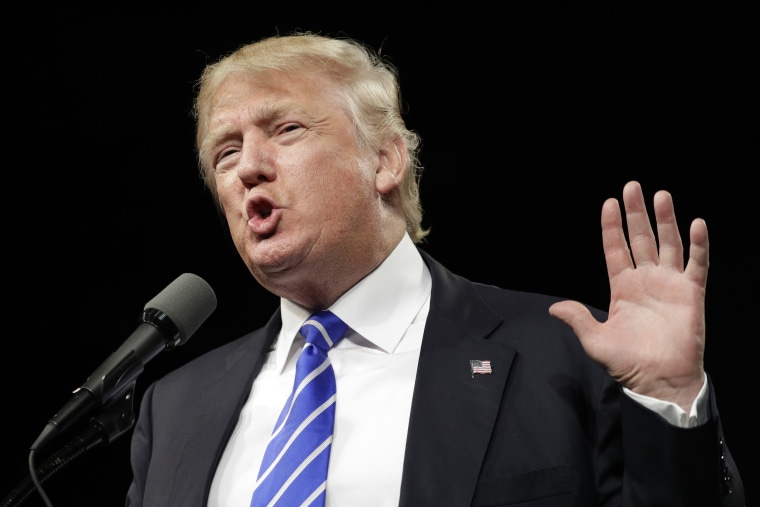The issue of Donald Trump's taxes was back in the spotlight Sunday after the New York Times published a report based on documents it said were Donald Trump's 1995 income tax returns.
The documents — just three pages mailed to a Times reporter last month — appear to show that the Republican nominee reported a $916 million loss, which, according to experts hired by the newspaper, could have allowed him to pay no federal income taxes for up to 18 years.
Related: Trump Tax Return Shows He Could Have Avoided Taxes for 18 Years: NYT
Throughout his presidential campaign, the GOP nominee has flouted custom by refusing to release his tax returns, a traditional vetting method for candidates, despite citing his successful record as a businessman as one of his major qualifications.
Trump and his surrogates have also offered up his personal generosity as evidence of his fitness for office, but evidence of that charitable giving remains scarce without the release of his tax returns.
Democratic nominee Hillary Clinton, meanwhile, has put nine years of tax returns on her campaign website. The Clintons have also previously released more than three decades of returns.
Here's what we know — and what we don't — about Donald Trump's income and taxes:
What We Know
Donald Trump declared a $916 million loss in 1995, which could have allowed him "to cancel out an equivalent amount of taxable income over an 18-year period," according to the New York Times. But there is nothing in the report that shows he actually took advantage of the rules to avoid paying taxes. A Trump campaign statement in response to the article said: “Mr. Trump is a highly-skilled businessman who has a fiduciary responsibility to his business, his family and his employees to pay no more tax than legally required." His surrogates have said it is a sign of "genius."
In 1978 and 1979, Trump did not pay any federal income taxes. We know this because in 1981, when Trump was attempting to obtain a casino license, the state of New Jersey analyzed his finances and issued a report that cites his income and federal tax payments for 1975 through 1979. Politifact found that Trump's federal tax bill for the first three of those five years was $71,932 on a reported income of $219,334 (not adjusted for inflation)." The other two years, Trump did not federal taxes pay due to loses in excess of $3 million. Additionally, the returns themselves were never made public. There's only the casino commission report.
Two tax court cases from the early 1990s indicate that it is likely Trump paid no income taxes in 1984.
Separate documents from the New Jersey Division of Gaming Control and the Casino Control Commission obtained by Politico appear to indicate that Trump did not pay income taxes in 1991 and 1993 because "Trump’s losses were large enough to prevent him from owing taxes." Trump's campaign responded to the Politico report with, "Welcome to the real estate business."
Trump at one point received a New York State property tax break that only applies to residents making $500,000 or less.
Trump said during the first presidential debate that not paying taxes "makes me smart."
In an interview with Meet the Press in January 2016, Trump said, "I try and pay as little tax as possible, because I hate what they do with my tax money. I hate the way they spend our money."
Trump has said since the primaries that the reason he won't release his tax returns is because they are under audit. Trump has not released a copy of the audit letter, but it is a reasonable assumption that he would be subject to a lengthy audit, given that his returns are so complex (Trump holds interests in some 500 separate entities, according to the financial disclosure reports presidential candidates are required to submit). The IRS has said, however, that being under audit does not preclude a person from releasing their returns to the public.
Trump's tax counsel, Morgan, Lewis & Bockius LLP, sent a letter in March 2016 corroborating that Trump is under audit and has been since 2002. But the letter also said that inquiries from the year 2002 to 2008 have been closed "administratively." If one accepts that a presidential candidate's income tax returns under audit should not be released despite no legal impediment, Trump's returns from 2002 to 2008 could be released.
What We Don't Know
Trump's tax rate. In May, he told ABC News that his federal income tax rate was "none of your business."
- What Trump earns. Trump has claimed his net worth is somewhere around $10 billion. Most recently, Forbes pegged it at $3.7 billion (a decline of $800 million). His tax returns would afford an approximation of his true net worth.
The extent of Trump's business interests, including foreign ventures.
- Specifics surrounding Trump's debt. A Times investigation suggests that his companies have at least $650 million in debt, "twice the amount than can be gleaned from public filings he has made as part of his bid for the White House."
The extent of Trump's personal charitable giving, which would be itemized as deductions.
